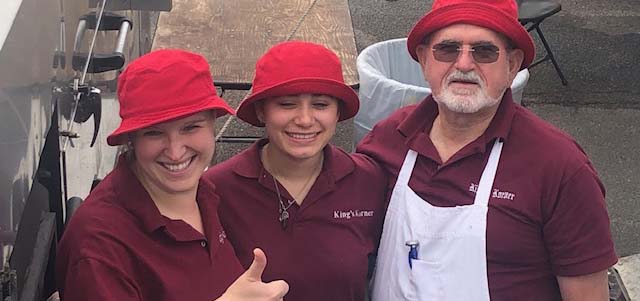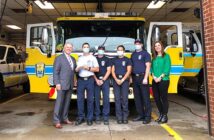When R.M. “Dickie” King, Jr. opened King’s Korner Catering and Restaurant in 1982, at the corner of Matoaca and Hickory roads in southern Chesterfield County, he had no idea of the challenge his business would face 38 years later.
The restaurant, which normally operates out of the Chesterfield Airport, employs six full-time staff members with a combined 125 years’ experience and, according to King, “on any given day, 25 additional part-time staff to accommodate corporate events, government events, and weddings.” For five years, King’s Korner was the exclusive caterer for David’s Bridal, and within the last 25 years, the catering division of the restaurant has provided food for over 1,500 weddings. “With the coming of Covid-19,” King said, it became “a catering business that has a restaurant instead of a restaurant that caters.” Between the restaurant’s temporary closure and the cancellation of contracted events, King’s business lost over 20,000 meals in recent months. “Our business was dramatically affected,” King said.
One way King has innovated to stay operational and serve the community is through a mobile site he set up at 4412 West Hundred Road, in the old Chester Village Shopping Center parking lot. “Our mobile site has a Virginia Department of Health-licensed and approved mobile kitchen with two tents and a mobile cooker,” he said. “Our large box truck has storage, a food warmer, refrigeration, and freezers.”
Fortunately for his business, King was set up for such an operation before the pandemic struck. “The concept was mine from the beginning,” he said. “I felt there was a need for organizations to raise money and a need for the people during time of disaster.” To help meet that need, years ago King had invested $250,000 in his two mobile kitchens. Long before Covid-19 was a household term, King’s Korner was using its mobile units to hold fundraisers for a myriad of groups, including schools, fraternities and charitable and philanthropic organizations. “Our kitchens have provided services to those in need and during times of disasters,” King said. His current outdoor setup, while novel to his customer base, is not new to him or his dedicated employees.
“Cooking at a mobile location is much more difficult than from our restaurant with a commissary,” he said. “Trying to maintain the integrity of the food is a challenge.” Safely transporting foods already prepared in the commissary also proves challenge. “As a result,” King said, “we have a money back guarantee with the return of the leftover product should a customer be dissatisfied.”
Employees at the mobile station make a concerted effort to provide safe, delicious food to the community. “We sanitize everything, as we should anyway. We wear hats, masks, and gloves. We ask customers to stay in their cars and the food is brought to them in microwaveable containers that are put in bags.” The health and safety of King’s Korner employees and customers is of paramount importance to King.
While the current restrictions on businesses have taken a toll on his business, King said he has “tried to be patient and understand that it is not [my]opinion that matters, but the safety and well-being of the public—[which]happen[s]to be our customers and friends.”
His mobile operation underwent two health inspections, both of which it “passed with flying colors,” King said. “We take great pride in that we have earned 10 perfect health inspections in a row.”
Although King is proud to serve the community through his mobile kitchen, he admits: “The restaurant is much more cost efficient; [and]therefore less costly. There is no travel, no extra labor with long hours.” A restaurant does not require gas for generators or propane for cookers. In addition, King explained that a mobile operation with walk-up service under normal conditions would need three fewer employees per shift than he needs now in order to meet current guidelines. “There are a lot of hidden costs,” King said.
Regardless of the costs of running his innovated, outdoor operation, King said, “I have, to this point, focused on the staff’s salaries, and God has provided. I have been less focused on profit.” Paraphrasing a favorite phrase, King said, “I believe that Scripture says for me to worry about those that take care of me first.”
So far, it seems to be working. King has not had to lower any employees’ salaries, and no one has missed a paycheck. This, King said, is “partially due to the stimulus package that President Trump provided small businesses.”
While his business has enjoyed relative success during these tough economic times, King says he has “strong doubts about the catering business for large events returning to normal any time soon,” and restaurants, he predicts, are likely to be “heavily burdened as a result of social distancing. People per square footage dictates bottom line for restaurants. When they are asked to separate customers, which reduces their usable square footage, then their potential earnings are cut proportionally. A lot of restaurants won’t recover for years.”
Even while King projects the catering and restaurant side of his operation may suffer, he has some ideas for future success. “We may use our mobile kitchens to open a division in our business that returns us to our roots—in addition to having a restaurant, a banquet hall, and catering,” he said.
King and his employees have gone the extra mile to continue serving their customers, and King said the most positive aspect of this experience has been “our wonderful staff that keeps our business going, and our customers [who]are the most loyal and faithful.” King and his staff refer to these people as their family. “Because we are isolated at the Chesterfield Airport and a destination restaurant, we are deeply honored that customers sacrifice their time in driving to have us serve them.”
While King says his hours may change, currently, the mobile food station is open from 11 a.m. to 7 p.m., Tuesday through Sunday.


